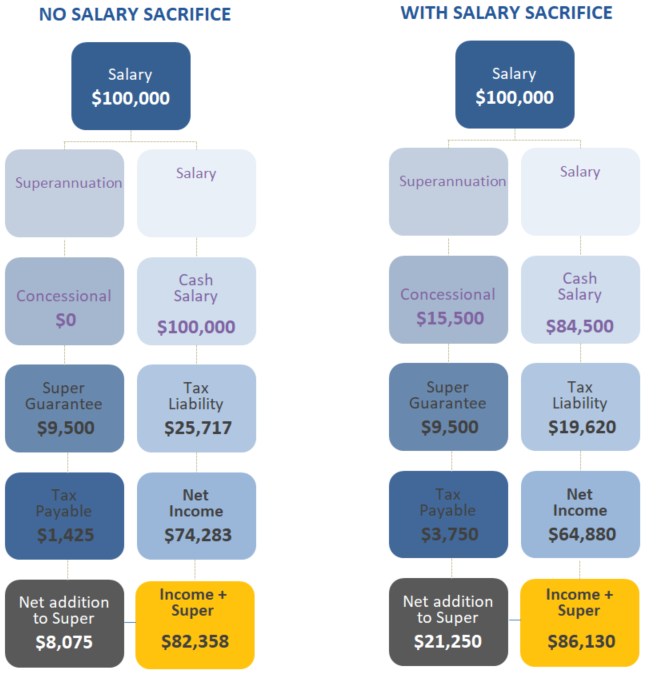Under the current rules, the maximum amount of “concessional” superannuation contributions that can be claimed by an individual is $25,000.00 per annum. This is referred to as the “Concessional Contributions Cap”. Concessional contributions refer to those contributions that are claimable as a tax deduction by the person or entity paying the contribution. They include employer contributions, salary sacrifice contributions and personal deductible contributions.
A salary sacrifice arrangement is where an employee agrees with their employer to reduce their gross salary in return for the employer making a larger contribution (above the normal 9.5% of salary) to the employee’s superannuation fund. The benefit that arises is due to the difference in tax rates between that of a superannuation fund (which is 15%) and the marginal tax rate of the employee which is usually much higher. The following table illustrates the benefit from a typical salary sacrifice arrangement.

Note that in this example, the take home pay is reduced by $9,403 but the amount in the employees super fund has increased by an additional $13,175, an overall increase in after tax income/savings of $3,772 or 4.6%.
One of the obvious downsides of salary sacrificing is the reduction in take home pay. These arrangements are also “prospective” in that they must be put in place only in relation to future earnings and can’t be used to make lump sum contribution amounts out of past earnings such as accrued leave entitlements.
Up until 30th June 2017, the so called “10% rule” applied where you could only claim personal contributions if your income from employment was less than 10% of your total income. This restriction meant that for many employed individuals, the only way to make deductible personal contributions to reduce their taxable incomes was via a salary sacrifice arrangement. With the changes applying from 1/7/2017, employees can now make additional personal contributions to their superannuation fund at any time during the year and this can be an alternative (or supplement) to salary sacrificing. The important thing is to remember that total concessional contributions should not exceed the cap of $25,000 and this cap includes; superannuation guarantee contributions by the employer, salary sacrifice contributions and personal deductible contributions.
Bob Locke – Chartered Accountant & SMSF Specialist
The information provided in this article is general in nature and does not take into account your personal circumstances, needs, objectives or financial situation. This information does not constitute financial advice. Before acting on any information in this article, you should consider its appropriateness in relation to your personal situation and seek advice from an appropriately qualified and licensed professional.

